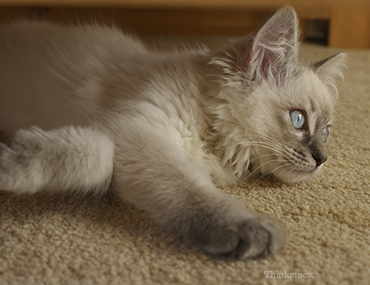
The term “calcemia” refers to the level of calcium in the blood. Calcium is a natural element found in the body and on the earth and is abbreviated on the periodic table as “Ca.” Hypercalcemia means high calcium, while hypocalcemia means low calcium. Both conditions can potentially be life threatening and should be treated as soon as possible.
The diagnosis of hypercalcemia is based on two blood tests: a total serum calcium level, and an ionized calcium level (often abbreviated iCa). A total serum calcium level is very easy to measure, and most veterinarians can routinely test for this. Normal total serum calcium is approximately 8-11 mg/dL, with significant hypercalcemia being defined as more than 10.5 mg/dL in cats. An ionized calcium level is slightly more difficult to measure, and is only readily available as a send out test or at most specialty clinics or emergency clinics. Ideally, an ionized calcium level should be performed as it is more specific and more accurate. Normal ionized calcium levels are either 1.12-1.32 mmol/L or 4.5-5.3 mg/dL, with significant hypercalcemia being defined as more than 1.4 mmol/L or >5.5 mg/dL.
What causes hypercalcemia in cats?
In cats, hypercalcemia can be caused by:
- Idiopathic hypercalcemia in cats (no known medical cause)
- Inappropriate diet or nutrition
- Kidney failure – both acute and chronic
- Primary hyperparathyroidism (i.e., an overactive parathyroid gland)
- Diseases affecting the bone (e.g., cancer or fungal infections in the bone)
- Hypoadrenocorticism (due to underactive adrenal glands)
- Poisonings (e.g., cholecalciferol mouse and rat poison, Dovonex psoriasis cream, calcium supplements, vitamin D, etc.)
- Cancer
- Aluminum toxicity (e.g., from oral phosphate binders to lower the phosphorous levels in the body)
Symptoms of hypercalcemia in cats:

- Not eating or decreased appetite
- Vomiting
- Diarrhea
- Lethargy and weakness
- Excessive thirst and urination (although this is subtle in cats)
- Weight loss
- Constipation
- Enlarged lymph nodes (if associated with lymphosarcoma [cancer])
- A mass near the voice box on the neck (which may be a parathyroid gland tumor)
- Straining to urinate, difficulty urinating, or even bloody urine secondary to calcium-containing crystals or stones in the bladder
Diagnosing hypercalcemia
The work up for hypercalcemia in cats can be initially expensive because it’s important to rule out serious causes of hypercalcemia such as hypercalcemia of malignancy – a high calcium level secondary to cancer. While this is more common in dogs, it can rarely be seen in cats. Once all these tests have been performed, normal results will identify the “cause” of idiopathic hypercalcemia in cats.
A complete work up for hypercalcemia in cats should include:
- Complete blood count to look at the white and red blood cells and platelets
- Chemistry panel to look at the kidney and liver function
- Electrolytes to look at the calcium, phosphorous, and salt balance (e.g., sodium, potassium, etc.)
- Urinalysis to look for the presence of an underlying infection, crystals, or appropriate urine concentration
- Urine culture to rule out an underlying urinary tract infection
- Feline leukemia (FELV) and feline immunodeficiency virus (FIV)
- X-rays to rule out underlying cancer, bladder stones, or evidence of mineralization of tissue (secondary to hypercalcemia)
- Ultrasound to rule out underlying cancer, bladder stones, or inappropriate mineralization
- Parathyroid hormone (PTH) and PTH-rP concentration (parathyroid hormone related protein) levels. With hyperparathyroidism, the PTH levels are typically normal to high. With hypercalcemia of malignancy, PTH-rP concentrations are typically elevated. With idiopathic hypercalcemia in cats, PTH levels and PTH-rP levels are typically low.
Hypercalcemia treatment in cats
Depending on what the underlying cause is, treatment may include intravenous (IV) fluids, dietary changes (especially to low calcium diets), surgery (to remove an overactive parathyroid gland), chemotherapy (if diagnosed with cancer), steroids, and numerous other drugs to affect calcium absorption.
When it comes to hypercalcemia in cats, the sooner you and your veterinarian recognize and identify it, the sooner it can be potentially treated. When in doubt, talk to your veterinarian about treatment options, which vary with the underlying disease. Fortunately for felines, the prognosis for hypercalcemia in cats is often much better than in dogs.
